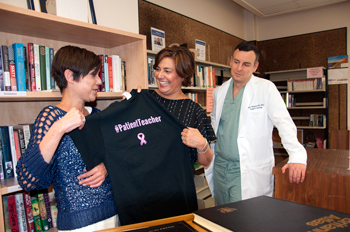The patient as teacher

By Leslie Shepherd

Demetra Turnbull and Jennifer Schultz examine T-shirts designed by Dr. Jory Simpson for his patients who have agreed to help teach his medical students about their experience and perspective. (Photo by Marcello Silles)
Dr. Jory Simpson says he can teach medical students how to become doctors.
But he can’t teach them what it’s like to be a patient about to undergo body-changing surgery or other life-saving treatment. Or what it’s like to sit in a waiting room, day after day, week after week, all the time thinking about what else is going on in their lives, whether it is exams, relationship woes or worries about how their children are coping.
That’s why he has enlisted some of his breast cancer patients to become patient-teachers starting this fall, helping third-year medical students understand the patient experience.
“Students often think of surgery as cut and done; that’s the image in the media and on TV,” said Dr. Simpson, assistant medical director of the CIBC Breast Centre at St. Michael’s. “But in real life, we often have long relationships with patients. I hope this new curriculum will change the way they perceive what it’s like to be a patient and emphasize the humanistic side of surgery.”
University of Toronto medical students will have two sessions with patient-teachers during their eight-week surgical rotations at St. Michael’s. At the end of their rotation they will have a debrief with Dr. Simpson and write a reflection.
Dr. Simpson said it’s up to the patient-teachers to decide what they want to say in their workshops. They’ll receive training from Susan Blacker, the former director of cancer services at St. Michael’s, and Aimee Hindle from Professional Practice.
“The only rule is that no doctor is allowed in the room,” he said. “This is about empowering patients and allowing them to tell their own stories about survivorship.”
Jennifer Schultz, an academic editor and writer who was diagnosed in December 2015 with stage 3 lobular breast cancer, said she volunteered to be a patient-teacher as “my way of giving back to St. Michael’s for the amazing care I received here.”
Did you know? The CIBC Breast Centre has more than 20,000 patient visits a year, half from women with cancer. |
“It’s my way of trying to make something good out of something that was really bad,” she said. “I hope to help them realize they need more than a scalpel. They need to get to know the patient, what else is going on in their lives. It’s easy to do a mastectomy; it’s not as easy to see a patient through to the other side.”
Demetra Turnbull, who was diagnosed in January 2015 with stage 3 breast cancer and lymph node involvement, said she hopes to coach the students to appreciate patients as individuals.
“People handle things differently,” said Turnbull, who owns Chalkboard Publishing, a company that produces educational material to help children succeed. “Some want a lot of information, some don’t. Some are going to have caregivers, some won’t. Some will have a supportive family, some won’t.”
Diagnosis was not Day 1 of being sick, Turnbull said, it was Day 1 of getting better.
Dr. Simpson said the idea for patient-teachers flowed from discussions between him, surgeon-in-chief Dr. Ori Rotstein, and Dr. Arno Kumagi, the new vice-chair of education at the University of Toronto’s Department of Medicine, who had a similar program at the University of Michigan Medical School. Dr. Simpson said he believes this is the first patient-teacher program anywhere in surgery.
About St. Michael’s Hospital
St. Michael’s Hospital provides compassionate care to all who enter its doors. The hospital also provides outstanding medical education to future health care professionals in more than 29 academic disciplines. Critical care and trauma, heart disease, neurosurgery, diabetes, cancer care, care of the homeless and global health are among the Hospital’s recognized areas of expertise. Through the Keenan Research Centre and the Li Ka Shing International Healthcare Education Centre, which make up the Li Ka Shing Knowledge Institute, research and education at St. Michael’s Hospital are recognized and make an impact around the world. Founded in 1892, the hospital is fully affiliated with the University of Toronto.
